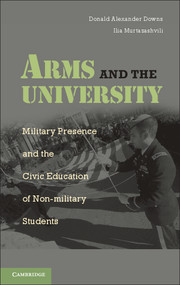Book contents
- Frontmatter
- Contents
- Tables
- Acknowledgments
- Part I A Normative and Pedagogical Framework
- Part II ROTC and the University
- 3 ROTC and the University
- 4 ROTC and the Ivies
- 5 ROTC and the Ivies
- 6 ROTC, Columbia, and the Ivy League
- 7 Post-DADT
- 8 Pedagogy and Military Presence
- 9 Winning Hearts and Minds?
- Part III Military History Examined
- Part IV Concluding Thoughts
- Index
- References
5 - ROTC and the Ivies
The Divorce
Published online by Cambridge University Press: 05 June 2012
- Frontmatter
- Contents
- Tables
- Acknowledgments
- Part I A Normative and Pedagogical Framework
- Part II ROTC and the University
- 3 ROTC and the University
- 4 ROTC and the Ivies
- 5 ROTC and the Ivies
- 6 ROTC, Columbia, and the Ivy League
- 7 Post-DADT
- 8 Pedagogy and Military Presence
- 9 Winning Hearts and Minds?
- Part III Military History Examined
- Part IV Concluding Thoughts
- Index
- References
Summary
In the years around 1968, a utopian exhilaration swept across the student universe and across several adult universes as well, and almost everyone in my own circle of friends and classmates was swept up in it. . . . Four enormous revolutions were roiling the world, at that one moment. . . . And from each of those revolutions, and from the combination of all four, radiated an intense excitement, which came beaming down on us and on people like ourselves in scattered university towns all over the world . . .
[In later years] it was obvious that those long-ago efforts to change the shape of the world were a young people’s rehearsal, preparatory for adult events that only came later. Suddenly it was obvious that the authentic political revolution of our era was now, not then; liberal and democratic, not radical leftist in the ’68 style; real, not imaginary.
– Paul BermanStupidly, we thought revolution was imminent. Our rage blinded us. I now believe that the war in Vietnam drove us crazy.
– Mark Rudd, former leader of Students for a Democratic Society, Columbia University, speaking at the university’s twentieth anniversary of the 1968 crisisIn this chapter, we examine ROTC’s exodus from the Ivy League in the late 1960s, preparing us to look in the next two chapters at the movement to bring the program back after September 11, 2001, including the major steps taken at Harvard and Columbia in early 2011 to recall ROTC after a decades-long exodus. We begin by considering trends in the Ivy League and the nation, focusing later on Columbia University, where the major action took place.
- Type
- Chapter
- Information
- Arms and the UniversityMilitary Presence and the Civic Education of Non-Military Students, pp. 131 - 160Publisher: Cambridge University PressPrint publication year: 2012



